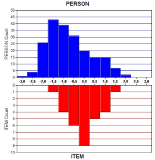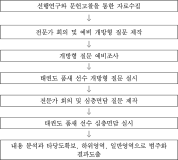
The purpose of this study was to develop and validity Competitive State Anxiety Scale for Taekwondo Form athlete(CSATF). The participants were composed of the 48 Taekwondo Form athlete to explore sub-factors of Competitive State Anxiety for Taekwondo Form athlete. The data were collected by an open-ended questionnaire and interview. The participants were composed of 257 national Taekwondo Form athlete to develop Competitive State Anxiety Scale for Taekwondo Form athlete. This 157 athlete data were used for items analysis, reliability analysis and exploratory factor analysis. And 100 athlete data were utilized for confirmatory analysis. Also convergent validity, discriminant validity, predictive validity latent mean analysis of CSATF were performed The results of this study were as follows. Firstly, the results revealed that the four general dimensions were identified such as cognitive anxiety, somatic anxiety, state of confidence, environmental anxiety. Secondly, CSATF comprised cognitive anxiety(5 item), somatic anxiety(5 item), state of confidence(5 item) and environmental anxiety(6 item). Thirdly, convergent validity, discriminant validity and predictive validity, the multi-group analysis according to gender examined validity of CSATF.


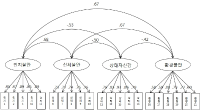
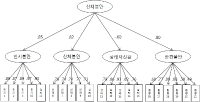

Sport Imagery Questionnaire of Hall et al.(1998) was developed to investigate the imagery type of athletes objectively. The purpose of this research is to verify validity and reliability of Korean SIQ by using Rasch Model, in order to make up for complement drawback of SIQ which was developed only using factorial analysis. This research conducted first and second questionnaire survey. Second survey was conducted targeting different study participants from those of first survey. The participants of first survey was 265 athletes of Chungcheong Province, and the participants of second survey was 169 athletes of Chungcheong Province. SPSS 21, Winstep 3.62, and AMOS 18 was used for date analysis. The result of Rasch Model verification for the data of first survey revealed that 8 items of SIQ were unfit. Thus, 5 factors and 22 items were determined. 7 point Likert scale was revealed to be a good fit. The result of Confirmatory Factor Analysis for the data of second survey revealed that Construct Validity of 5 factors and 22 items was valid and reliability was high by recording Cronbach’α value .954. External Validity was revealed to be high by showing that correlation between sport confidence and MG-M imagery was high.

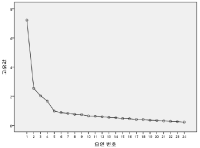
Purpose The purpose of this study was to develop the sport 5C scale of the Korean version. Methods The participants were 772 high school students from 17 to 19 who participated in sport regularly. The validation of Sport K-5C followed a three-step validation procedure through substantive stage, structural stage, and external stage. Results First, In the substantive stage, Sport K-5C consisted of 50 items with 5 factors. Second, in the structural stage, although Sport K-5C was explored as 24 items with 4 factors by EFA, but as a result of CFA, Sport K-5C was confirmed as 24 items with 5 factors. Third, the external stage provided additional validity through correlations of tests with other questionnaires which are similar concept and opposite concept, and group differentiation. Conclusions Sport K-5C is composed of 5 factors and 24 items. The factors are Caring, Character, Confidence, Competence, Connection. This scale can be used to provide an objective evaluation of positive development of youth in sport and physical education context.

Purpose The purpose of this study was to develop a Korean Life Skills Scale for Sports (KLSSS) that original version is the LSSS developed by Cronin and Allen (2017). Methods The subjects were 899 middle school and high school students. The measurement tool was used with LSSS. The validation of KLSSS followed a three-stage of validation procedure; substantive stage, structural stage, and external stage. The result is as follows. Results First, In the substantive stage, KLSSS consisted of 47 items with 8 factors. As a result of the item clarity test, it was confirmed that all the items were appropriate. Second, in the structural stage, KLSSS was explored and confirmed as 5 factors and 18 items. Third, in the external stage, KLSSS showed discrimination and convergent validity. Conclusions KLSSS is composed of 5 factors and 18 items. The factors are teamwork (TW), goal setting (GS), time management (TM), social skills (SS), and leadership (LD). This scale can be used to obtain information on life skills in school physical education or sports.
Purpose The purpose of this study was to develop a psychic energy management scale that construct a concept and based on extracted contents of structural validity and reliability of university athlete psychic energy management inventory. Methods To develop the scale, the researches were completed <research ⅰ; constructing sub-factors of Psychological Energy Management, ⅱ; developing scales of psychic energy management, ⅲ; verifying validity of psychic energy management>. The results shown are a follows. Results The psychic energy management inventory contents of the university athlete were categorized into five categories ; team energy, game energy, environment energy, leisure energy and body energy. Through statistical procedures and factor analysis, the psychic energy management inventory was developed with 4 factors 18 items (coach energy 4 question items, game/environment energy 6 question items, colleague energy 4 question items, body energy 4 question items). Conclusion Convergent validity and discriminant validity was demonstrated through the external validity, the multi-group analysis confirmed the structural equivalence of the scale between the school grades.
PURPOSE The purpose of this study was to validate the Korean version of Coaching Life Skills in Sport Questionnaire (KCLSS-Q). METHODS Substantive, structural, and external stages were undertaken to address the purpose of this study. At the substantive stage, the scale was translated by discussing with an expert panel and testing item clarity. Ten coaches (9 males, Mage=33.80, SD=4.21) participated in the item clarity test. At the structural stage, descriptive statistics, exploratory factor analysis (EFA), and confirmatory factor analysis (CFA) were conducted. A total of 249 (214 male, Mage=34.18, SD=6.82) and 232 coaches (186 male, Mage=34.26, SD=7.69) participated in the EFA and CFA, respectively. At the external stage, correlation analysis using other scales (emotional intelligence in sport coaching, EISSC) was conducted to examine concurrent validation. A total of 130 copies of the CFA data were randomly extracted and used for this stage. RESULTS For the EFA, the scale extracted five factors with 27 items. In the CFA, however, five factors with 26 items were identified as an appropriate structure. Finally, the relationships of all sub-factors between KCLSS-Q and EISSC were statistically significant in the correlation analysis. CONCLUSIONS KCLSS-Q should reasonably consists of nine items on structuring and facilitating a positive sport climate, five on understanding life skills, four on practicing life skills, five on understanding life skills transfer, and three on practicing life skills transfer. KCLSS-Q can be used as a valid measure to evaluate the coaching life skills of Korean coaches.
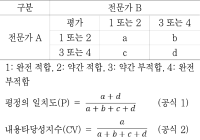
Purpose Common content knowledge(CCK) is composed of rules, techniques, and tactics. Such knowledge is a requirement for effective teaching of physical education (PE). There are, however, few validated tests of CCK. Thus, the purpose of this study was to develop a CCK test of soccer and evaluate the validity and reliability of the test using Rasch modeling (Rasch, 1980). Methods We developed thirty item common content knowledge test for soccer. Then, we used Rasch modeling to evaluate the validity and reliability of a test of soccer. Pre-service teachers (N=92) majoring in physical education and non-PE major (N=111) participated in this study. Results Thirty questions demonstrated good item-model fit. Moderately high internal consistency for person-ability and high internal consistency for item-difficulty are reported. Both Infit and Outfit statistics showed a good fit between the data and the Rasch model. Conclusions The analysis provides evidence to support the validity and reliability of this instrument as a CCK test of soccer. Limitations of the study were discussed and suggestions were provided to improve the test.

